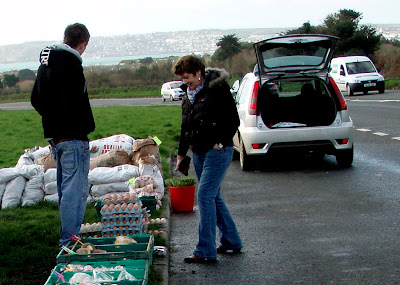This is a turnip, a vegetable very close to my heart. My father grew and cut this turnip. This turnip is just one of the thousands of turnips that my father, grandfather and myself have grown over the past 70 years. If have ever eaten a pasty, and I’m sure many of you have, then you would have tasted one of my father’s finest.
Yet this turnip is different to most of the turnips most of you in this room have recently bought.
My father sold this turnip directly to the consumer by the roadside; making more money for himself, without using wasteful packaging and without excessive delivery.
We’ve an idea so simple, so obvious and so workable that it will revolutionise the way we buy local produce. An idea right on our main roads that is already working, already tried and tested.
We’d like to introduce you to Shopbylayby.
Supermarkets are popular because they are convenient. It’s a simple formula. You know that a supermarket will be open when you want it to be, there will be somewhere to park and you know it’ll have the essential items you want.
We have that formula on our main roads.
There are people trading from laybys in Cornwall; laybys on main roads where you can park easily. However, you never know if these outlets are open or if they will be selling the items you require at a quality you’d expect.
At present, layby traders are a motley crew of burger vans, wooden duck carvers and men selling potatoes, mackerel, firewood and pickled onions from a back of a rusty van.
Shopbylayby will be a network of licensed retail outlets situated in laybys on busy main roads in Cornwall.
Shopbylayby will be a network of licensed retail outlets situated in laybys on busy main roads in Cornwall.
Jo, you’ve spoken to some current layby traders?
We know they are attracting around 78 customers a day, spending on average £5 each. This means a weekly take of over 2000 pounds per pitch. When are they open?
In the main, from 9am-4pm, missing the peak rush hour business.
What do they sell?
Usually, their own-produced food. They lack the capacity, logistics and premises to stock other essentials like bread and milk.
So Jo, what’s the solution?
A recognisable brand based on a strategic formula of good, local food at a good price, in a good location.
This will be the selling unit.
Shelving units inside will be designed in sympathy with producers’ delivery boxes, minimising the need for packaging.
So how does it work?
Well, the purpose of Shopbylayby is to facilitate direct trading between producer and consumer. The units will be staffed by the producers as a collective, so they can promote their own products. Buyers can then meet producers and buy with confidence
We spoke to Rob, a layby trader near Penzance. He sells all local produce, much of it from his father’s farm. He said he was very busy and would very much jump at the chance to sell from a retail unit on the same site. We also spoke to his customers who said they shopped there regularly as the quality was good, the price reasonable and the location convenient.
So, what are we proposing?
We propose that trading laybys are licensed. Applicants who wish to trade must possess the necessary food handing certificates, pledge to be open for set hours of the week and stock local food including essentials.
We propose that trading laybys are licensed. Applicants who wish to trade must possess the necessary food handing certificates, pledge to be open for set hours of the week and stock local food including essentials.
Shopbylaybys will be subject to license fee for which the trader will obtain a water and electric supply, a unit to trade from, waste collection and marketing and publicity.
The Shopbylayby could run a membership scheme offering discounts, recipes, food suggestions, special offers to other businesses and a reusable Shopbylayby food tray.
We’ve written a general business plan, located several funding streams and consulted food industry experts.
However, we would like to advance this project to the pilot stage where we can open and manage a strategic Shopbylayby before rolling out the concept throughout Cornwall, and the UK.
To make this project the success it deserves to be, we need a more thorough evaluation. There needs to be a comprehensive, meticulous analysis into planning, power and water supply, licensing, location, existing farm shops, health and safety, waste disposal, food handling and sanitation as well as further quantified market research and a realistic cashflow forecast.
We also need to purchase a shipping container in order to construct the optimum Shopbylayby retail unit.
£10,000 will allow us to perfect this model in order to attract future funding and investment. When Cornwall launches Shopbylayby it will be based on a sound practical and economic model. This is a tried and tested model that requires nurturing and regulation to ensure growth.
The question is not whether the Shopbylayby model will work. By involving bodies like Cornwall Council and other organisations, we can share the vision, innovation and dedication to help our local producers.
Two hundred years ago, the Cornish spirit of innovation and invention brought about an industrial revolution.
Let us prove that this spirit is still alive and we are ready as a team bring about a Cornish food revolution with Shopbylayby.


















































